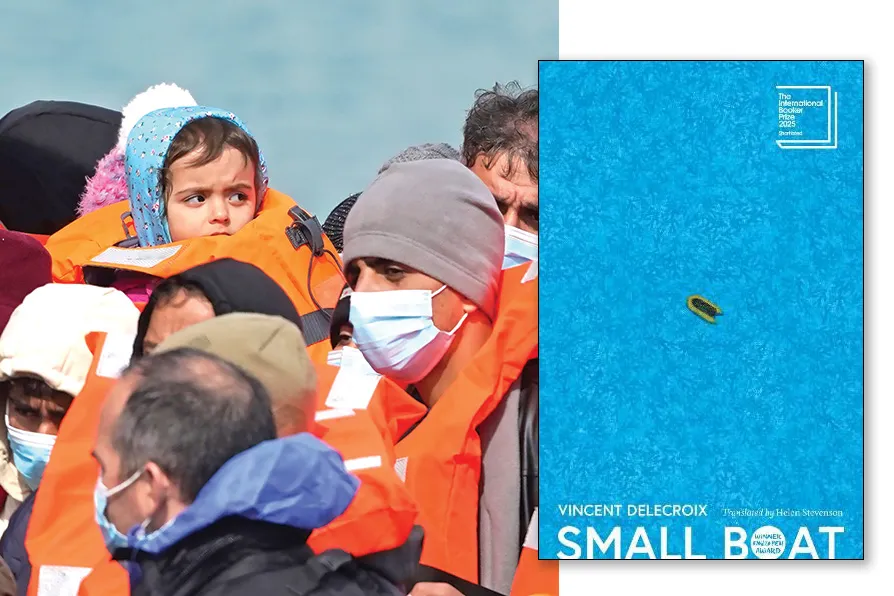MARIA DUARTE picks the best and worst of a crowded year of films
MARJORIE MAYO recommends an accessible and unsettling novel that uses a true incident of death in the Channel to raise questions of wider moral responsibility

 A group of people thought to be migrants are brought in to Dover, Kent, following a small boat incident in the Channel
A group of people thought to be migrants are brought in to Dover, Kent, following a small boat incident in the Channel
Small Boat
Vincent Delecroix, Hope Road, £12.99
Translated from the French by Helen Stevenson
SMALL BOAT is one of the most thought-provoking books that I’ve read about the contemporary challenges of migration.
The focus is on those who risk their lives crossing the Channel in inflatable dinghies in the hope of safety on the other side, but the novel’s implications are far wider, raising broader questions about the nature of evil and the nature of moral responsibility, both individually and collectively: unsettling questions about complicity in the sufferings of migrants.
The writer is a French philosopher as well as being the prize-winning author of a number of previous novels and the book is currently shortlisted for the International Booker Prize 2025.
Although this is a work of pure fiction, the novel is inspired by a true story that was widely reported at the time. In November 2021 a small inflatable dinghy was launched from a beach near Dunkirk, carrying at least 29 migrants — including a young child — on their way to England. Within a few hours at sea the outboard motor failed and the dinghy began to leak. Despite the migrants’ distress calls to both French and English authorities, they were left to drown, with only two survivors left to tell their story.
The second section provides a fictionalised account of their experiences that night, focusing on the young man who made repeated calls for rescue from his mobile phone. He was among the last to drown in the early hours of the following morning. This is an almost unbearable read, being so vivid and so incredibly distressing.
The first and third sections, in contrast, focus on the woman who was responsible for responding to distress calls at the regional monitoring and rescue centre (known as CROSS) at Cap Gris-Nez, near Calais. They explore her reflections recorded during her interrogation by the police. Some of her comments are extremely disturbing, especially the outrageously callous comments made in passing. Her colleague had made a comparably callous joke. But that joke didn’t get recorded, she reflected, so no-one was going to call him a monster — it was only her voice that was audible.
”I have no problem listening to the recordings of that night and hearing my own voice,” she commented, “because it’s not the voice of a monster or a criminal on the tape – it’s the voice of all of us.”
Many others, including her former husband, had expressed even harsher views about migrants. Why weren’t they left to be rescued in English waters or sent back to Africa? But she was the only one to be singled out as a monster.
The police woman interrogating her was increasingly horrified and exasperated by her responses, and her failure to accept responsibility for her behaviour that night. But what, precisely, was she being accused of doing, or not doing, she wonders? Was it about errors of judgement and incompetence? Or was it also about her moral insensitivity, her tone of voice, or the degree of her inhumanity? Or was it her failure to provide the migrants with reassuring cliches, telling them that they would be rescued — even if that wasn’t actually true?
There are echoes here of Camus’s novel The Outsider, about a Frenchman who was condemned for not demonstrating socially appropriate feelings, rather than for the murder of his Algerian victim.
By the third section, I wasn’t clear whether her reflections were based on her responses to an interrogator or her own tussles with her conscience. She seemed to be testing out various possibly mitigating factors, such as her love for her daughter and her struggles as a single parent, only to dismiss these in turn. The Nazis also loved their families, she reflected, so that wouldn’t do. Nor would the fact that she was keeping her feelings out of her work, only obeying orders in a bureaucracy that required regulations to be followed regardless.
Even if the refusal to acknowledge her guilt (for what crime, precisely?) exasperates her interrogator, she does succeed in posing some very challenging questions. Is it really just about me, she asks. This would be very convenient for everyone else. But what about migration policy, or the trafficking mafia, the war in Syria or famine in the Sudan, for example? And what about the wider complicity? Expressing empathy with the plight of refugees makes people feel better. But what is actually being done about it?
She imagines asking the man who spat on her if he was actually going to help the guy who was sleeping in a cardboard box at the foot of his own building? Or was that her job again?
This small book poses so many questions and has so much relevance for our times. I found it to be an extremely uncomfortable read, despite its stylistic accessibility. I read it through fairly quickly, only to realise that I needed to reread it all over again.
Highly recommended and here’s to its success in the Booker Prize.

MARJORIE MAYO recommends a disturbing book that seeks to recover traces of the past that have been erased by Israeli colonialism

These are vivid accounts of people’s experiences of far-right violence along with documentation of popular resistance, says MARJORIE MAYO












